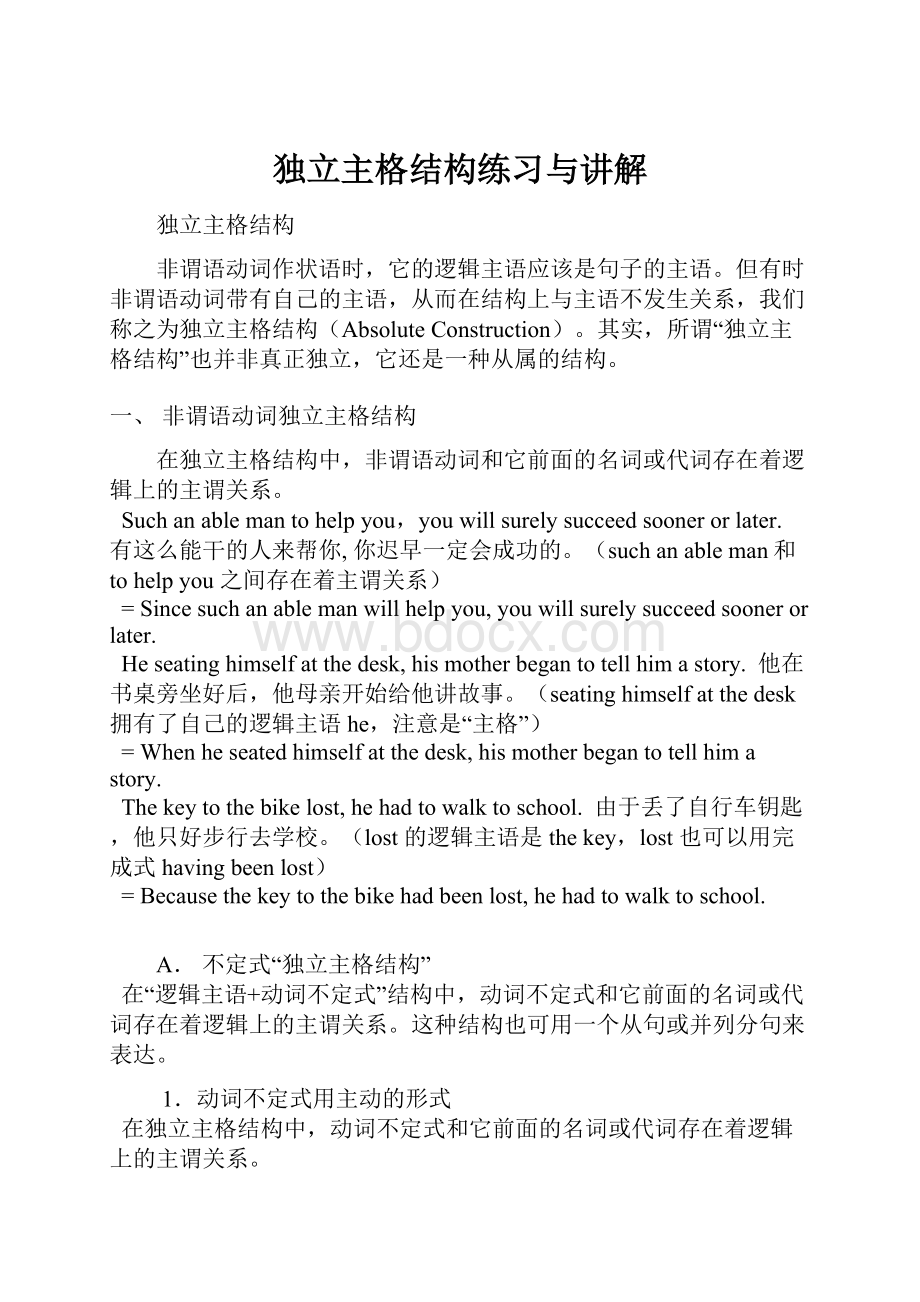独立主格结构练习与讲解.docx
《独立主格结构练习与讲解.docx》由会员分享,可在线阅读,更多相关《独立主格结构练习与讲解.docx(13页珍藏版)》请在冰豆网上搜索。

独立主格结构练习与讲解
独立主格结构
非谓语动词作状语时,它的逻辑主语应该是句子的主语。
但有时非谓语动词带有自己的主语,从而在结构上与主语不发生关系,我们称之为独立主格结构(AbsoluteConstruction)。
其实,所谓“独立主格结构”也并非真正独立,它还是一种从属的结构。
一、非谓语动词独立主格结构
在独立主格结构中,非谓语动词和它前面的名词或代词存在着逻辑上的主谓关系。
Suchanablemantohelpyou,youwillsurelysucceedsoonerorlater. 有这么能干的人来帮你,你迟早一定会成功的。
(suchanableman和tohelpyou之间存在着主谓关系)
=Sincesuchanablemanwillhelpyou,youwillsurelysucceedsoonerorlater.
Heseatinghimselfatthedesk,hismotherbegantotellhimastory. 他在书桌旁坐好后,他母亲开始给他讲故事。
(seatinghimselfatthedesk拥有了自己的逻辑主语he,注意是“主格”)
=Whenheseatedhimselfatthedesk,hismotherbegantotellhimastory.
Thekeytothebikelost,hehadtowalktoschool. 由于丢了自行车钥匙,他只好步行去学校。
(lost的逻辑主语是thekey,lost也可以用完成式havingbeenlost)
=Becausethekeytothebikehadbeenlost,hehadtowalktoschool.
A.不定式“独立主格结构”
在“逻辑主语+动词不定式”结构中,动词不定式和它前面的名词或代词存在着逻辑上的主谓关系。
这种结构也可用一个从句或并列分句来表达。
1.动词不定式用主动的形式
在独立主格结构中,动词不定式和它前面的名词或代词存在着逻辑上的主谓关系。
Hismothertocometonight,heisbusypreparingthedinner.他母亲今晚要来,他正在忙着准备饭菜。
(=Ashismotheristocometonight,heisbusypreparingthedinner.)
——Willyougototheconcerttonight 你今晚去听音乐会吗?
——sorry,somanyexercise-bookstocheck,Ireallycan'taffordanytime.对不起,有这多的作业要批,我真的抽不出时间。
(=BecauseIshallchecksomanyexercise-bookstonight,Ireallycan'taffordanytime.)
Thefourofusagreedonadivisionoflabour,eachtotranslateaquarterofthebook.我们四人同意分工干,每人翻译全书的四分之一。
(=Thefourofusagreedonadivisionoflabourandeachistotranslateaquarterofthebook.)
Manytrees,flowers,andgrasstobeplanted,ournewly-builtschoolwilllookevenmorebeautiful. 种上许多的树,花和草后,我们新建的学校将看上去更美。
(=Ifmanytrees,flowers,andgrassareplanted,ournewly-builtschoolwilllookevenmorebeautiful.)
B.-ing形式“独立主格结构”
动词的-ing形式作状语时,其逻辑主语一般应与句子的主语保持一致。
Beingill,hewenthome. 由于生病,他回家了。
(=Ashewasveryill,hewenthome.)
Seatinghimselfatthedesk,hebegantoreadamagazine.在课桌旁坐好后,他开始看杂志。
(=Whenhehadseatedhimselfatthedesk,hebegantoreadamagazine.)
1.表示时间的-ing形式作“独立主格结构”
Everyonebeingready,theteacherbeganhisclass. 每个人都准备好后,老师开始上课。
(相当于一个时间状语从句Wheneveryonewas ready)
Thechairmanbeganthemeeting,everyonebeingseated. 每个人坐好后,主席开始开会。
(相当于一个时间状语从句aftereveryonewasseated)
2.表示原因的-ing形式作“独立主格结构”
Theboyleadingtheway,wehadnotroublefindingthestrangecave.由那个男孩带路,我们没有困难就找到了那奇怪的洞。
(相当于一个原因状语从句Becausetheboyledtheway)
Manyeyeswatchinghim,hefeltabitnervous.许多眼睛看着他,他感到有点儿紧张。
(相当于一个原因状语从句Asmanyeyeswerewatchinghim)
必背:
含有being的独立主格结构。
ItbeingNationalDaytoday,thestreetsareverycrowded.今天是国庆节,街上很拥挤。
=AsitisNationalDaytoday,thestreetsareverycrowded.
Therebeingnofurtherbusinesstodiscuss,weallwenthome.没有别的事可讨论,我们都回家了。
=Astherewasnofurtherbusinesstodiscuss,weallwenthome.
3.表示条件的-ing形式作“独立主格结构”
Timepermitting,wewillhaveapicnicnextweek. 时间允许的话,我们下星期将进行一次野炊。
(相当于一个条件状语从句Iftime permits)
Myhealthallowing,Iwillworkfarintothenight.我的健康许可的话,我愿工作到深夜。
(相当于一个条件状语从句Ifmyhealthallows)
4.表示方式的-ing形式作“独立主格结构”
Thestudentsarewalkingintheschoolhappily,eachwearingacardinfrontofhischest.学生们快乐地在学校里走着,每个人胸前都带着一张卡。
(相当于一个并列分句andeachwearsacardinfrontofhischest)
Theboylayonthegrass,hiseyeslookingatthesky. 男孩躺在草地上,眼睛看着天空。
(相当于一个并列分句andhiseyeswerelookingatthesky)
C.-ed形式“独立主格结构”
与逻辑主语+动词的-ing形式一样,如果-ed形式的逻辑主语和句子的主语不一致的话,就需要用-ed形式的独立主格结构。
ThebookwritteninsimpleEnglish,Englishbeginnerswereabletoreadit.该书是用简单英语写的,英语初学者也能看懂。
( =AsthebookwaswritteninsimpleEnglish,Englishbeginnerswereabletoreadit.)
Theworkersworkedstillharder,theirlivingconditionsgreatlyimproved. 由于工人们的生活条件大大提高,他们工作得更起劲了。
( =Astheirlivingconditionsweregreatlyimproved,theworkersworkedstillharder.)
Hewaslisteningattentivelyinclass,hiseyesfixedontheblackboard. 他上课专心听讲,眼睛紧盯着黑板。
(=Hewaslisteningattentivelyinclass,andhiseyeswerefixedontheblackboard.)
Thetaskcompleted,hehadtwomonths'leave. 任务完成以后,他休了两个月的假。
(=Whenthetaskhadbeencompleted,hehadtwomonths'leave.)
比较:
动词不定式表示动作没有发生或即将发生,动词-ed形式表示动作已经结束,动词-ing形式往往表示动作正在进行。
Themanagerlooksworried,manythingstosettle.经理看上去很着急,有这么多的事情要处理。
(事情还没有处理,而且是由经理本人来处理,用不定式tosettle)
Themanagerlooksrelaxed,manythingssettled.许多事情已经处理好了,经理看上去很轻松。
(事情已经处理好了,用动词-ed形式settled表示动作已经结束)
Thefoodbeingcooked,theboywaswatchingTV.小孩一边做饭,一边看电视。
(两个动作同时进行)
Thefoodcooked,theboywenttobed. 饭做好了,小孩去睡了。
(两个动作有先后,饭已做好,小孩才去睡觉的)
二、无动词独立主格结构
“逻辑主语+being+其他”是独立主格结构中的“逻辑主语+动词-ing形式”的一种形式。
在这种结构中,being往往可以被省去,这种省去being的结构,称之为无动词“独立主格结构”。
A.逻辑主语+名词
Tenstudentsenteredforthecompetition,theyoungestaboyof12.
十个学生报名参加了这次竞赛,年纪最小的是个12岁的男孩。
(theyoungest和aboyof12之间省去了being)
注意:
独立主格结构中的being在下列两种情况下一般不能省略,一是在“Therebeing+名词”结构中,二是在逻辑主语是代词的情况下。
Therebeingnobus,wehadtowalkhome.由于没有公共汽车,我们只好走回家。
ItbeingSunday,alltheofficesareclosed.因为是星期日,所有办公室都关门。
B.逻辑主语+形容词
Heturnedtome,hiseyessleepy. 他睡眼惺忪地转向我。
(hiseyes和sleepy之间省去了being)
=Heturnedtome,andhiseyesweresleepy.
Hestoodthere,hismouthwideopen. 他站在那里,嘴张得大大的。
(hismouth和wideopen之间省去了being)=Hestoodthere,andhismouthwaswideopen.
C.逻辑主语+副词
Schoolover,weallwenthome.放学了,我们都回家了。
(school和over之间省去了being)
=Schoolwasover,andweallwenthome.
Hesatathisdesk,hisshoesoff. 他坐在课桌旁,没穿鞋子。
(hisshoes和off之间省去了being)
=Hesatathisdeskandhisshoeswereoff.
D.逻辑主语+介词短语
Heisstandinginfrontoftheblackboard,hisbacktowardsus.他站在黑板面前,背对着我们。
=Hewasstandinginfrontoftheblackboard,andhisbackwastowardsus.
Thenewteachercamein,asmileonherface. 新老师面带微笑走了进来。
=Thenewteachercameinandshehadasmileonherface.
Theteachercameintotheclassroom,aruleinhishand.老师走进教室,手里拿着一把直尺。
=Theteachercameinandarulerwasinhishand.
提示:
在“逻辑主语+介词短语”构成的独立主格结构里,如果名词用单数,可以不用冠词,同时介词短语里的限定词也可省略。
Themusicteacherstoodatthedoor,violininhand.
音乐老师站在门口,手里拿着一把小提琴。
(=Themusicteacherstoodatthedoor,aviolininhishand.)
三、with/without引导的独立主格结构
介词with/without+宾语+宾语的补足语可以构成独立主格结构,上面讨论过的独立主格结构的几种情况在此结构中都能体现。
A.with+名词代词+形容词
Hedoesn’tliketosleepwiththewindowsopen.他不喜欢开着窗子睡觉。
=Hedoesn’tliketosleepwhenthewindowsareopen.
Hestoodintherain,withhisclotheswet.他站在雨中,衣服湿透了。
=Hestoodintherain,andhisclotheswerewet.
注意:
在“with+名词代词+形容词”构成的独立主格结构中,也可用已形容词化的-ing形式或-ed形式。
Withhissonsodisappointing,theoldmanfeltunhappy. 由于儿子如此令人失望,老人感到很不快乐。
Withhisfatherwell-known,theboydidn’twanttostudy. 父亲如此出名,儿子不想读书。
B.with+名词代词+副词
Ourschoollooksevenmorebeautifulwithallthelightson. 所有的灯都打开时,我们的学校看上去更美。
=Ourschoollooksevenmorebeautifulifwhenallthelightsareon.
Theboywaswalking,withhisfatherahead. 父亲在前,小孩在后走着。
=Theboywaswalkingandhisfatherwasahead.
C.with+名词代词+介词短语
Hestoodatthedoor,withacomputerinhishand.或 Hestoodatthedoor,computerinhand.
他站在门口,手里拿着一部电脑。
=Hestoodatthedoor,andacomputerwasinhishand.
Vincentsatatthedesk,withapeninhismouth.或 Vincentsatatthedesk,peninmouth.
文森特坐在课桌前,嘴里衔着一支笔。
=Vincentsatatthedesk,andhehadapeninhismouth.
D.with+名词代词+动词的-ed形式
Withhishomeworkdone,Peterwentouttoplay. 作业做好了,彼得出去玩了。
=Whenhishomeworkwasdone,Peterwentouttoplay.
Withthesignalgiven,thetrainstarted. 信号发出了,火车开始起动了。
=Afterthesignalwasgiven,thetrainstarted.
Iwouldn’tdaregohomewithoutthejobfinished.工作还没完成,我不敢回家。
=Iwouldn’tdaregohomebecausethejobwasnotfinished.
E.with+名词代词+动词的-ing形式
Themanfeltveryhappywithsomanychildrensittingaroundhim. 有这么多的孩子坐在他周围,那男子感到很高兴。
=Themanfeltveryhappywhenhefoundsomanychildrensittingaroundhim.
Thegirlhidherboxwithoutanyoneknowingwhereitwas. 小女孩把盒子藏了起来,没有人知道它在哪里。
=Thegirlhidherboxandnooneknewwhereitwas.
Withoutanyonenoticing,heslippedthroughthewindow.他趁没人注意的时候,从窗口溜走了。
=Whennoonewasnoticing,heslippedthroughthewindow.
F.with+名词代词+动词不定式
Thelittleboylookssad,withsomuchhomeworktodo. 有这么多的家庭作业要做,小男孩看上去很不开心。
=Thelittleboylookssadbecausehehassomuchhomeworktodo.
Thekidfeelsexcitedwithsomanyplacesofinteresttovisit. 有这么多的名胜可参观,小孩很激动。
=Thekidfeelsexcitedastherearesomanyplacesofinteresttovisit.
提示:
在with/without的复合结构中,多数情况下with能省略,但without不能省略。
Withoutawordmorespoken,sheleftthemeetingroom.
她没再说什么话就离开了会议室。
(without不能省略)
四、独立主格结构的句法功能
独立主格结构在句中除了能充当原因状语、时间状语、条件状语和伴随状语外,还能作定语。
在形式上,“独立主格结构”可位于句首、句中或句尾,并通常用逗号与主句隔开。
A.作状语
独立主格结构作状语,其功能相当于一个状语从句或并列分句。
1.表示时间
Nightcomingon,weputourselvesupinasmallhotel.夜幕降临,我们在一家小旅馆住了下来。
(=Whennightcameon,weputourselvesupinasmallhotel.)
Alltheguestsseated,theybegantheirdinner. 所有的客人就坐后,他们才开始吃饭。
(=Whenalltheguestswereseated,theybegantheirdinner.)
Witheverythingsheneededbought,Gracetookataxihome. 所需要的都买好后,格雷斯打的回家了。
(Aftereverythingsheneededwasbought,Gracetookataxihome.)
2.表示原因
Withalotofdifficultproblemstosettle,thenewly-electedpresidentishavingahardtime.
有许多难题要解决,新当选的总统日子不好过。
(=Ashehasalotofdifficultproblemstosettle,thenewly-electedpresidentishavingahardtime.)
Therebeingnomeansoftransportation,hehadtowalkhomeatmidnight.由于在半夜没有交通工具了,他只好步行回家。
(=Astherewasnomeansoftransportation,hehadtowalkhomeatmidnight.)
3.表示条件
Weatherpermitting,wewillholdouryearlysportsmeetingnextweek.如果天气允许的话,我们下星期将